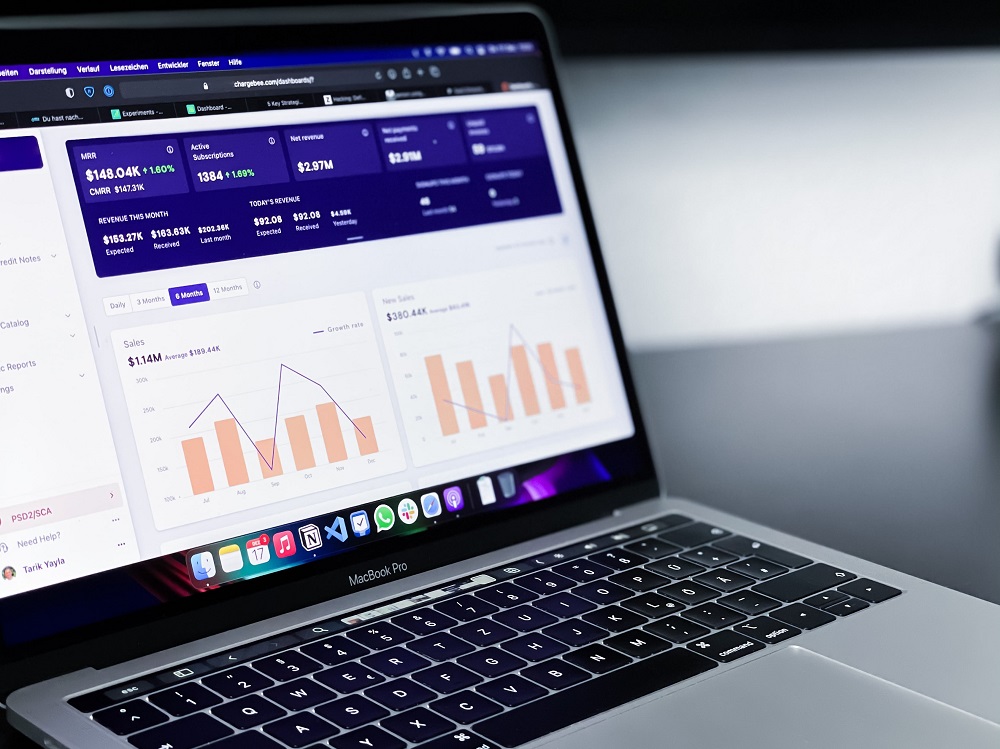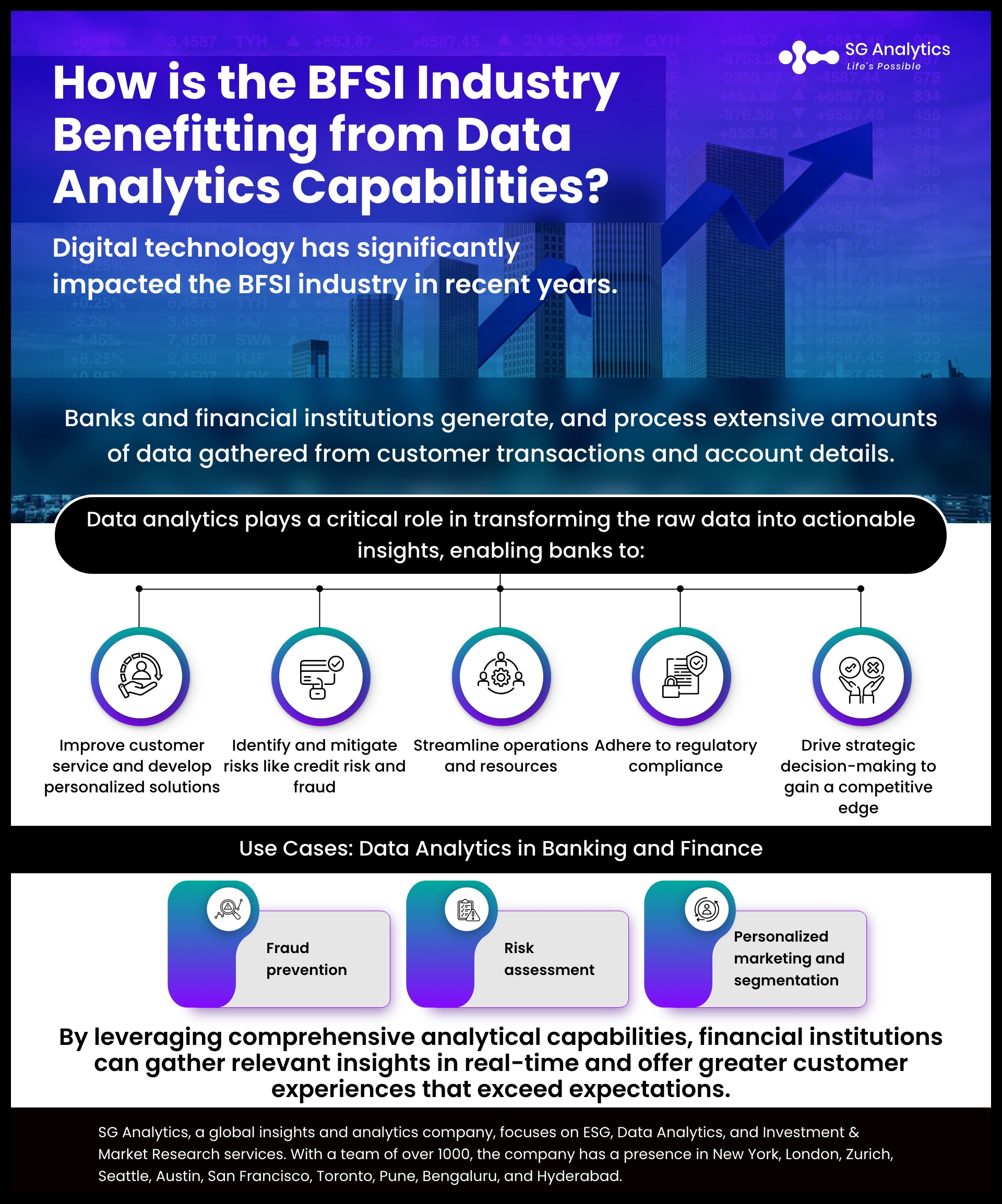The Banking, Financial Services, and Insurance or BFSI sector has been growing in its capabilities due to the growing pace of digitization. Moreover, the sector is becoming more competitive, thereby empowering modern customers.
Technologies and data analytics tools have been invariably assisting banks and financial institutes in reflecting all required regulations and staying competitive while attending to the digital needs of their customers. Data analytics solutions are aiding financial institutions in making smarter data-backed decisions.
In today’s data-driven world, the BFSI sector is relying on big data technologies to analyze, store, and manage structured and unstructured data in real time. The main goals that the banking and financial sectors are striving to achieve scalable growth include performance, risk reduction, and profitability. BFSI companies are optimizing their operations across all functions with an aim to improve the efficiency of their systems, enhance service-delivery models, and protect their systems against cyber threats.
Read more: The Changing Fintech Landscape: Top Trends

Data Analytics in Banking and Finance
The Banking and Financial Services and Insurance industry (BFSI) has been one of the early adopters of data analytics. With the growing adoption of IoT solutions and the rise of big data, the industry has been reinventing itself to keep up with the growing pace of the market. Additionally, factors like rise in operational costs, market competition, and incremental risk are further driving banks and financial institutes to innovate and differentiate constantly.
Banking has been considered a data-heavy industry. Due to this reason, data analytics holds the power to redefine the playing field through data-driven decision-making. Data analytics solutions are assisting financial institutions across different horizontals. With a data-driven and evidence-based business model, banks can better understand their customers, market trends, and competitors to empower the workforce better.
While data solutions have always helped companies to achieve analytics excellence, the component that has changed is the scope of their applications which today is driven by the volume, variety, and velocity of the incoming data. Analysts are navigating these platforms to monitor vast volumes of data and identify market trends to develop effective strategies. And the value of the data relies on how it is collected, analyzed, and interpreted.
To seamlessly integrate analytical systems with new data architecture, enterprises are adopting cloud-based solutions to support their data analytics requirements.
Integrating Data Analytics in BFSI
By integrating data analytics, the BFSI industry processes the examination, cleaning, transformation, and modeling of raw data and extracts valuable insights to draw conclusions for informed decision-making. In banking, data analytics incorporates systematically employing data and quantitative analysis techniques to study customer behavior, identify new market trends, mitigate risks, and identify opportunities for growth.
Banks and financial institutions generate and process extensive amounts of data gathered from customer transactions and account details. Data analytics plays a critical role in transforming this accumulated raw data and transform it into actionable insights, enabling banks to:
- Improve customer service and develop personalized solutions
- Identify and mitigate risks like credit risk and fraud
- Streamline operations and resources
- Adhere to regulatory compliance
- Drive strategic decision-making to gain a competitive edge

Read more: The Future of Finance: How Tokenization is Helping to Unleash the Power of Blockchain
Operationalizing Data Analytics in BFSI
The steps the sector is incorporating to operationalize data analytics across operations are as follows:
- A data platform is being set up to retrieve relevant information that offers a holistic view of the customer, thereby offering strong data management.
- The strong in-house talent enhancement programs in banks and financial institutions are assisting in training analytics teams in the organizations as per emerging and existing regulations.
- There should also be scope for increased collaboration between analytics and business teams.
By fostering a work culture that inculcates decisions based on the insights generated from high-end statistical models, BFSI industries can generate substantial insights with data analytics.

Use Cases: Data Analytics in Banking and Finance
A prolific collector and generator and collector of data on a daily basis, the banking industry is undergoing a crucial transformation driven by the rapid development of digital technologies. One question that the industry is still trying to find answers to is how financial institutions are driving actionable insights from the accumulated data for better decision-making. And this is where data analytics in banking proves valuable.
By employing advanced analytical tools and techniques, banks and financial institutions can extract valuable insights into customer behavior, market trends, and internal processes. Let’s explore some of the common use cases of data analytics in the banking industry and examine how these applications are driving innovation, enhancing efficiency, and improving overall customer experiences.
-
Fraud Prevention
Fraud is a significant concern in the banking industry, and data analytics plays a vital role in detecting and preventing fraudulent actions. With advanced machine learning algorithms, banks can analyze vast amounts of transaction data and identify patterns and fraud anomalies. They can further use these insights to flag suspicious transactions, thereby restricting unauthorized access and reducing financial losses.
Read more: The Ultimate Guide: How will Data Analytics Transform the Insurance Industry

-
Risk Assessment
A thorough credit risk assessment is critical to maintaining a healthy loan portfolio and minimizing defaults. Data analytics is assisting banks and institutions in developing sophisticated credit scoring frameworks by incorporating a broader range of data like credit history, spending patterns, income, and social media activity. This comprehensive approach further helps with accurate risk assessments and informed lending decisions.
-
Personalized Marketing and Segmentation
Data analytics assists banks and financial institutions in segmenting their customers based on different factors, like demographics, spending habits, and financial goals. This segmentation allows banks to develop targeted marketing campaigns and provide personalized product offerings, thereby driving customer engagement. By leveraging data analytics, banks can also ensure that their marketing endeavors are more effective and generate higher returns.

Leveraging Data Analytics across the BFSI Sector
The use of data analytics has made the banking sector more efficient and controlled. The advantages data analytics provides to the BFSI sector include the following.
- Banks and financial institutions integrate data analytics to understand customer behavior based on different activities like investments or financial history. They can also find ways to retain existing customers while attracting new ones by offering personalized solutions.
- With data analytics, banks can boost their operations and reduce operating expenditures.
- Financial institutions can identify the unsatisfactory credit score of their customers as well.
- Banks today have access to innumerable data that can be easily handled by incorporating data analytics tools.
Data analytics is assisting banks and financial institutions in obtaining the insights they require to improve their services and meet customer expectations. With transactional data and the customer’s purchasing habits, banks can forecast which products or solutions are suitable for their customers. This will further enable the enterprises to stay ahead of the competitor and expand their customer base.
Read more: 7 Trends That BFSI Industry Cannot Ignore Anymore

Final thoughts
Digital technology has significantly impacted the BFSI industry in recent years. It has had a promising impact on the sector by authorizing banks, financial and insurance companies to engage with their clients on a larger scale. With its sophisticated capabilities, financial enterprises are able to establish risk profiles, acquire insights into customer behavior, and avert fraudulent transactions.
The efficiency of an organization is equally as important as the customer’s experience. Using integrating data analytics solutions, enterprises are employing data-driven methods to evaluate operational procedures and the performance of portfolios. Analytics platforms and data solutions are further assisting the enable the BFSI sector to make informed decisions and make significant commercial use of their data. By leveraging comprehensive analytical capabilities, financial institutions can gather relevant insights in real-time and offer greater customer experiences that exceed expectations.
With a presence in New York, San Francisco, Austin, Seattle, Toronto, London, Zurich, Pune, Bengaluru, and Hyderabad, SG Analytics, a pioneer in Research and Analytics, offers tailor-made services to enterprises worldwide.
A market leader in the BFSI space, SG Analytics assists businesses with insightful, relevant research along with sophisticated technology solutions. Contact us today if you are in search of a BFSI firm that helps in driving value-accretive decisions and executing efficient processes to enhance the efficacy of your investments.

